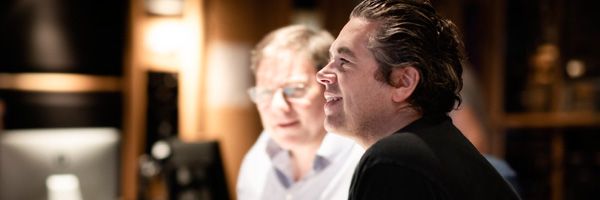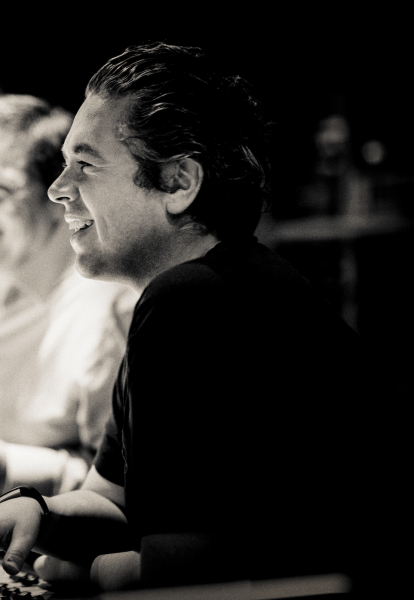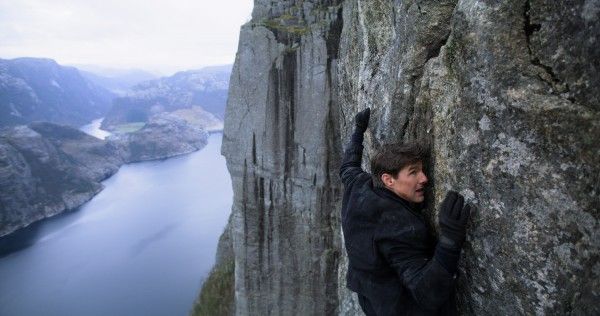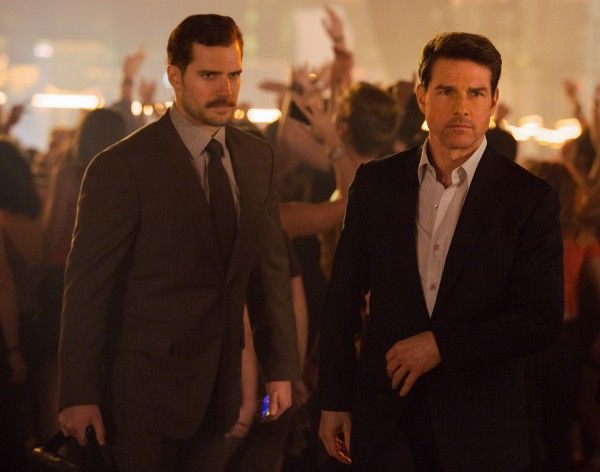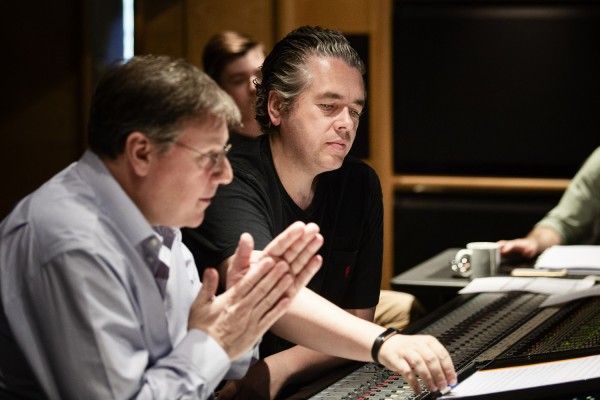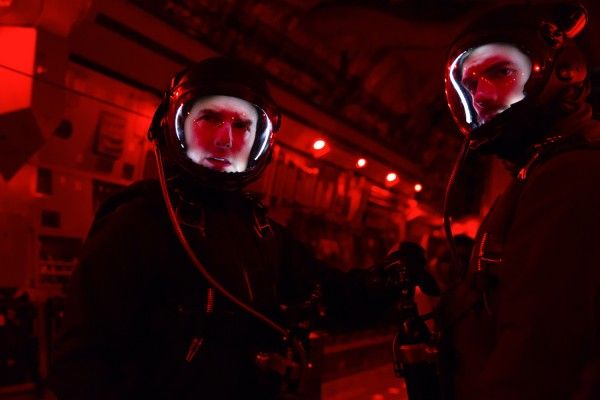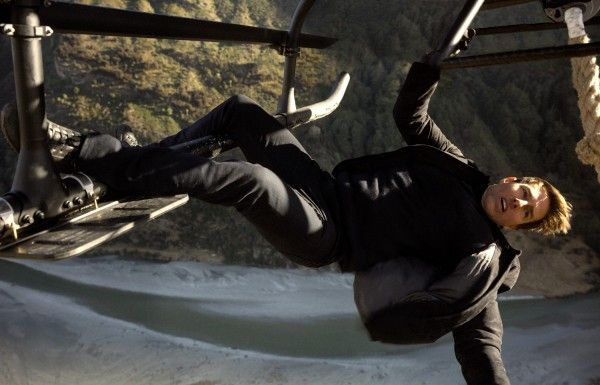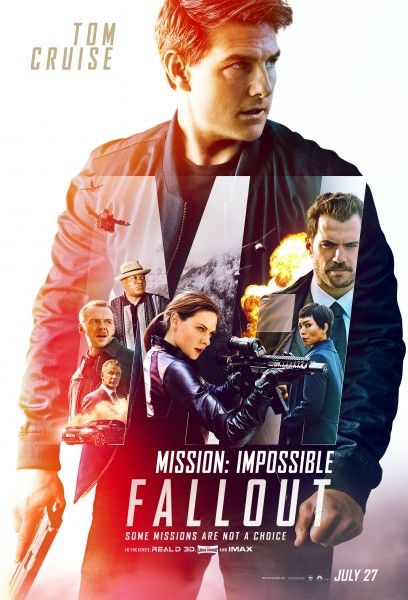When it comes to sequels, bigger does not always equal better. Many films think this holds true, but in reality, what makes a really good follow-up is a film the deepens the character dynamics in a unique way. Mission: Impossible – Fallout, however, is no ordinary sequel, and indeed writer/director Christopher McQuarrie found a way to have his cake and eat it too. This is simultaneously the biggest Mission: Impossible film thus far, and the most intimate. For the first time, audiences are invited inside the mind of Ethan Hunt to find out what makes Tom Cruise’s iconic character tick. We are also treated to an unrelenting, escalating series of jaw-dropping set pieces that stand as some of the best action ever put to film.
The high quality of Fallout also extends to composer Lorne Balfe’s epic, pulsing score, which plays a vital role in keeping the momentum up over the course of the movie’s two-hour plus runtime. There’s dynamism to Balfe’s work here that compliments the alternatively massive and emotional moments in the film, and when Fallout goes big, Balfe proves he’s more than up for the challenge with a thrilling soundscape. That’s all not to mention his unique spin on the classic Mission: Impossible theme, which feels absolutely huge and is guaranteed to make you run 1,000 times faster than normal speed.
I recently got the chance to speak with Balfe about his excellent work on the film, and the conversation was a delight. Balfe explained how he first got the gig, and what his initial conversations with McQuarrie entailed. He also talked about how he approached scoring a franchise as iconic as this one, and whether he looked to what other composers did to try and make sure Fallout stood out. And with Balfe having been mentored by Hans Zimmer, I had to ask whether the Mission: Impossible II composer had any advice for Balfe. We also discussed the current state of the film music industry, the difference between scoring films and video games, and much more. Check out the full interview below
Your score for this film is really fantastic.
LORNE BALFE: Well it's nothing in comparison to the movie, is the only way I can look at it. Somebody said to me yesterday, "So where did the inspiration come from to write such big music?" And I said, "Watch the movie." It's the reason we probably had one of the biggest orchestras on a score in a long time. Every time there's a new jump, or a new stunt, the next one's even bigger. And then the next one's even bigger, so the sheer epicness of it came from the visuals.
It sounds like an exciting and daunting prospect. How did you first get involved in it? How'd the project come your way?
BALFE: It came my way in several paths. I had worked on Dunkirk, and Jake [Myers] was a producer on that, and he was also the producer on Mission. So there was that connection. The other connection was I've worked a lot for Paramount and Skydance, so there's a lot of mutual relationships. And actually, Randy Spendlove from Paramount, the head of music, got me the meeting with Chris McQuarrie, so I was very fortunate for that.
They basically let this meeting happen, and every time Chris spoke about what the movie was about, and what the tone and the story was, I just went away and wrote. Instead of talking a lot, I basically wrote music and gave them a musical ledger of what he had been describing to me about Ethan's journey. And also, we're dealing with a very famous theme. It's one of the most well-known themes in the world. I wanted to also show how you can give it a more left-field approach, and just spin it on it's head. That was the journey, and we're coming up to close to a year ago that I really got involved in this. It's been a long journey.
I'm always curious, when it comes to collaborations between directors and composers, what those initial conversations were like and what ideas were seeded. What was that conversation like? What did you guys discuss? What was Chris looking for in the score for this film?
BALFE: I think he was looking for, musically, a different tone to what there had been in the past. I know everybody says they're a fan of these movies, but I remember when Mission 1 came out, and I was at college watching it. I remember watching that famous train scene with Tom Cruise on it, and since then, I was just a fan. Really, for the last 22 years I suppose I've been subconsciously writing this score. I've watched every Mission, and it was just a dream come true to get involved with it. But really the conversation was about Ethan's journey, and this different side to Ethan that you see. How do we tell that with our thematic DNA? How do we channel that with a different approach? That was the path to where we ended up.
One of the great things about this franchise is that each director has his own chance to put his own stamp on each movie, and it's very different and distinct. And the same is true of the scores of each movie. This one, you have Christopher coming back, and I know he said that he very consciously wanted to do something very different this time around. The scores for the other films are all great in their own right, and they're all also very different. Did you look back at those other scores? Was there a specific area or avenue you felt like this franchise had not gone down before?
BALFE: No, I didn't analyze too much. I knew all of the films. And I knew that, musically; from how Danny [Elfman] was the beginning of the film franchise, and then how Hans [Zimmer] twisted it and turned it around, and then Michael [Giacchino] and Joe [Kraemer’s] interpretations of it ... I knew it. As a failed drummer in life, one of my things was that I was always very aware of that rhythm. Of course you've got that very famous melody, but it's very percussive and it's very rhythmical. And it's the same as when you go back and watch the TV shows, it was very percussive. So I knew that pulse and pace were something that I wanted to delve into more, but also I just wanted to experiment with some of the instrumentation. Like bongos were always in the TV show, and I thought, "Why have one when we can have twelve?"
It's very like the stunts. It's trying to push things. I was just trying to push them to a larger form. So with the bongos, it's hard enough for one bongo player to get a gig these days. For twelve, it's a miracle. It was really being loyal to the past, but bringing it into the future. I think that that's what the movie does. You see Ethan Hunt, and you immediately hear Ethan Hunt.
Being given the keys to a franchise like this is great in and of itself, but you're also handed this incredible gift, which is the Mission Impossible theme. Each composer has kind of done his own thing with it, and I was curious, how did you approach that theme in relation to the rest of your score? What did you want to do with it?
BALFE: When you sit down and you start something like this, you spend most of the time petrified. You've now got the keys to the front door. You're allowed to finally touch it. You then have to distance yourself from that fear. The key to this theme was to not be worried about the past. There've been many versions. There's been Limp Bizkit, and just a lot of different interpretations of it, so I think you have to put them all to the past. Also, to me, the film was telling me what it was going to be, musically. The interesting thing with Chris is that he doesn’t to use temp music, which is very rare in movies nowadays. The music that I was writing was becoming the temp music, which is very different from what you would normally do on a movie. My writing room was next to his editing room. I was able to be next to him and Eddie Hamilton, so there was constant experimentation happening. When there was a new scene that had been filmed and they were experimenting with the edit, you were able to come in and say, "What if we did this, or what if we tried that?" You were able to musically keep experimenting and get constant feedback, so that was also a very unique way of work.
That sounds great. Was there one theme or sequence in particular that was really tough to nail down for you?
BALFE: All of them. All of the above (laughs). I think the hardest was the mission brief. I think that it's the same with all the Mission Impossibles. That mission brief is psychotic. It's when you get told important information to what you're about to experience, and there's a thin line where the music can't overtake the dialogue but has to support the story. That was the hardest scene. Yet probably when watching it, it doesn't seem that. The writing and supporting the understory ... That was the one.
You've worked with Hans Zimmer quite a lot. It's kind of funny that he worked on this franchise years ago, and now here you are. Did you have any discussions with him about it? Did he have any advice for you?
BALFE: My first ever job of doing additional writing for Hans was Batman Begins, so that's going back I don't know, are we at 13 years now? I was his assistant for maybe ten years, a long journey. When I found out about Mission, I never asked him for advice. I just said, "Do you remember what it was like for you?" He said, "The most important thing about it is have fun." And I think that's the key to it, because you're invited into this family. Mission is a family, and Tom is Ethan Hunt. When writing for it, I can't be aware of thinking about the fans watching it, and making sure I'm being loyal to that musical DNA, and not scaring them too much; making sure that they were going to enjoy that experience. So yeah, the main thing was to have fun. He was right. It's been an amazing journey for me, and I've learned so much from it, from Chris and Tom. It's been an amazing dream come true.
It seems like it's a really nice culmination moment for you. You're one of many composers that Hans mentored. I've spoken with Benjamin Wallfisch, quite a few others. I was curious what your relationship was with him when you were starting out, and how he influenced your craft. He's this big iconic presence, but he's so collaborative.
BALFE: The thing is, I still have to pinch myself when I'm writing with him. I have him on such a high pedestal, when I make a suggestion I still question why he's interested in my opinion. His background is from that commercial pop production, and the record industry is always about working with others and improvising and jamming. He taught me a lot about not being pressured about what we write. The film comes first, and if it doesn't work, you have to say goodbye to that music. We never talk about music, we talk about filmmaking. He's a filmmaker first and a composer second. He understands the concept of storytelling. He's been an amazing mentor, and still is. We just finished writing the new theme for FIFA, for the World Cup. So again, it's a continuous working relationship, frankly.
What’s your writing process like? Do you start with one particular instrument? Is there a time of day that's best for you, when you write music?
BALFE: No (laughs). My ideal working is really from when I wake up to when I sleep. Children have change that process, in a good way, but it really is a case of ... There's no planned formula. There's no one way of approaching it. Every single project deserves a different approach. On LEGO Batman I moved to Sydney and was writing in Australia for a while. That gives inspiration, moving to different environments. A composer's a pretty lonely life. When people talk about premieres and movie star—no. We sit in a dark room and spend a lot of time alone. Which is great fun, because you're getting something that you've dreamt of doing your whole life, so it's amazing. But there's never one clear way of doing it. Sometimes you start on a guitar, you start on a piano. Everyone has a different way of doing it.
You've also worked pretty extensively in the realm of video games, and I was curious: How does composing the score for a video game compare to the score for a feature film?
BALFE: It's no different. It's fascinating the way music has gone, because I remember when I was starting out 10 or 15 years ago, there was a stigma to do with the whole hierarchy of the composers, and I think that to touch a video game, people would look down on you. Now we find that the majority I can think of are involved in video games. It really all comes down to you're trying to tell a story. Even when you get the shoot-them-up gameplay games, I still think it all comes down to telling a story, and underlying what you're wanting the gamer or the viewer to experience. I haven't done many games recently in the last few years, simply because I haven't found the right games. I was very fortunate with Beyond: Two Souls and Assassin's Creed, and it's been difficult to find games that I feel I can add a voice to. It's difficult. But the process, and the medium, it's the same. Sometimes, it's just more music, because it's longer. But really, the whole journey that you go on is the same path.
I also wanted to ask, as someone inside this industry, it feels like a really exciting time. There's a lot of diversity. You have stuff like Nicholas Britell, or Daniel Pemberton. There's a really wide spectrum of what makes up a film score. It's not one thing, or in a neat box. What do you think about the state of the industry, and the evolution of it as the soundscape has changed?
BALFE: I think it's brilliant. I think it's exciting. I think that the whole point of music is that there shouldn't be rules. There is no right or wrong. And the fact that I may not like that piece of music and you may ... The validation is in the fact that somebody gets something from it. When some film music fans don't like the way film is evolving, becoming more hybrid, and they feel it should stay in the past ... If you do that, it's like saying filmmaking should have stayed in black-and-white. You learn from the past, and then that makes you understand the future. Music is so exciting. Why not use synthesizers? They can bring a new life to the score. It's never been such an interesting time, where I think 10 or 15 years ago it was the same composers doing all of the movies. Now, everybody's got the chance. I think that the concept of “the Hollywood score,” that cliché doesn't get used any longer. I think that's exciting.
It is, yeah. It's really exciting. Because not every type of music is right for every film. You look at even something like King Arthur. 20 years ago a medieval epic would be scored very differently, but that score is just so pounding and exciting and different.
BALFE: And it's no different than a good song. It stands the test of time. We went through the phase in the 80s and 90s of electronic scores, and then it went back to orchestral, and it'll get back to electronic. It goes in phases, but it's great to see different voices, like Daniel's, and composers you just wouldn't expect. That's what makes it exciting.
Whose work most informed your approach to music when you were an aspiring composer? Who were the composers that you were looking up to?
BALFE: Looking up to was Stewart Copeland and his score for Wall Street. I remember watching and going, "Is this music or is it sounds?" It was just amazing. The work of The Art of Noise. Again, it taught me a lot about how you can manipulate sound and make it musical. Classical, well Paul Williams, Hans' music, John Williams’ music. Everybody's really contributed a lot to my education, and I'm still learning. I feel I'm relatively new to it. It really is exciting, because you're just constantly being able to try new things and evolve. So I think those were great. They made me want to become what I'm doing now.

